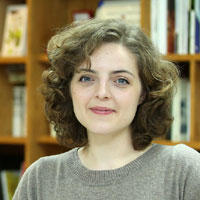View this article in another language
- 한국어
- English
- 日本語
- 中文
- العربية
- Español
- Français
- Deutsch
- Pусский
- Tiếng Việt
- Indonesian

Sophie Bowman
Han Kang is fast becoming the world’s favorite Korean writer. Translations of some of her works are already available in Chinese, Polish, Portuguese, French, Japanese, Spanish, Vietnamese and English.
The first time I heard Han Kang speak at an event organized by the LTI Korea I was intrigued by her soft voice and the way she chose her words to create amazing images in the minds of her audience. Then, earlier this year studying Korean Literature at Ewha Womans University, I learned from my fellow students how popular and well-loved Kang is in South Korea today. When I met her again this summer then, for a few minutes I felt pretty star-struck. It didn’t last long though, because Han Kang was kind and incredibly observant and made me feel relaxed right away. In some ways it is quite surprising then that her writing is so strong, so fraught, so disturbing and so defiant.
If you want to read her writing in English, the novel The Vegetarian is the best place to start. Translated by Deborah Smith and published in the UK in January 2015, The Vegetarian goes to the very core of the violence that is inherent in all of our lives. I’ll warn you, it’s quite a disturbing read, and once you’ve picked up the book you’ll find it hard to do anything else until you’ve read to the last page. You can read an excerpt from The Vegetarian here on The White Review website.
Although a couple of books translated from Korean have become best sellers, it’s rare that a Korean book translated into English receives the critical acclaim that was accorded to The Vegetarian. There are good reasons for this success. First of all, Deborah Smith’s translation is exquisite, and working closely with the writer she has ensured that nothing is lost while every word is artful and necessary. Second, the novel was edited to ensure that for English readers, as for their Korean counterparts, beautifully crafted prose makes it a joy to read. The third reason is that with bold cover art and marketing that ensured the kind of people who would enjoy this novel got to know about it, The Vegetarian was able to meet with the right readers, and thanks to Han Kang’s original and universal story, they all adored it.
Han Kang’s next English publication will be Human Acts, coming out in January 2016. Human Acts is a translation of Sonyeoni Onda, or literally ‘The Boy Approaches.’ This novel explores the 1980 Gwangju Massacre, and it is both harrowing and crucial. Unlike other books which recount horrific events, however, it is not just a testament or an account of horror for the sake of it, the beauty and introspection of this novel mean that it is not merely about one of the most important events of contemporary South Korean history. Human Acts delves down to the frightening roots which descend into the core of human nature which mean that such events repeat throughout history in different guises. Somehow, though, we keep going with a flickering hope, and this is present in Human Acts.
If you’re lucky enough to be able to read in French then you can get hold of Pars, Le Vent Se Lève, the award winning translation of Parami Punda Kara, literally: ‘The Wind Blows, Leave.’ The story behind this translation is as heart-wrenching as the novel itself. Undertaken as a co-translation by the wonderful team of Lee Tae-yeon and Genevieve Roux-Faucard, it was to become their first and last collaboration. While working on the translation Roux-Faucard became ill and spent the last months of her life endeavoring to complete it.
At the 13th Korean Literature Translation Awards ceremony, where the translators where awarded a $10,000 prize, a tearful Lee Tae-yeon spoke about their collaboration and Genevieve’s dedication to the project. As you can imagine there was hardly a dry eye in the house, but what came next was even more emotional. Her daughter Pascale got up to make a speech, and spoke about how her mother had felt inspired and grateful to have been able to work on such a meaningful and creative project in the last months of her life. She described how, even as her condition worsened, Genevieve had kept working on the story for which she had so much love. Even remembering the speech now is making me tear-up.
The French translation was heralded by Le Monde as ‘a strong and tremendous work of literature which reads as though it was written by a French writer.’ Hopefully one day I’ll be able to read the novel in English and I’m sure when I do I will often think of Genevieve Roux-Faucard and Lee Tae-yeon.
That’s the thing about Han Kang you see, as much as she inspires and enchants her readers here in Korea, so too she captures the imaginations of talented translators and her works make their way through the world as lovingly crafted translations, as wonderful as any book written in the target language to begin with.
(Sophie Bowman, translator of Korean literature)
Most popular
- Military discharge sets stage for reunion of all 7 BTS members
- 'We are back!' BTS Festa heralds hyped return of K-pop phenom
- K-pop streaming on Spotify skyrockets 470-fold in 10 years
- Hallyu gala MyK Festa from June 19 to feature K-pop acts
- President Lee starts G7 schedule via talks with S. Africa, Australia
